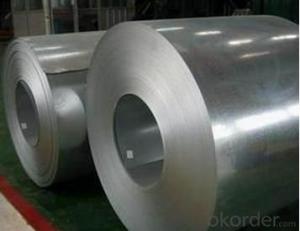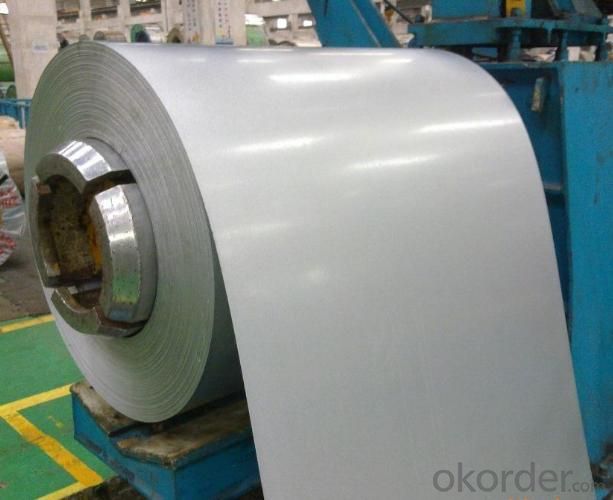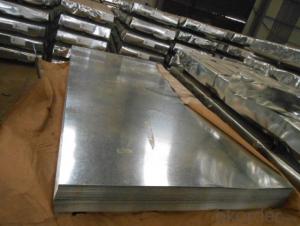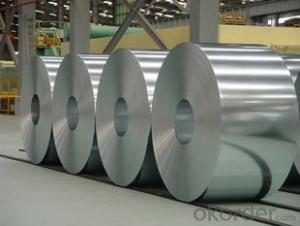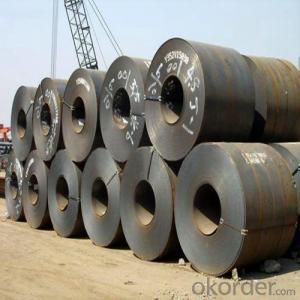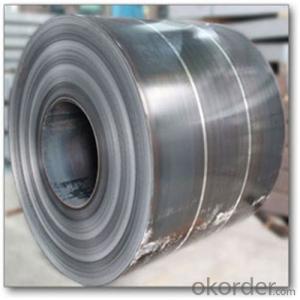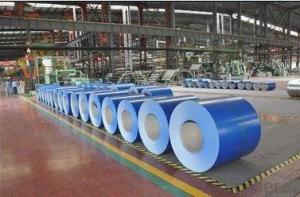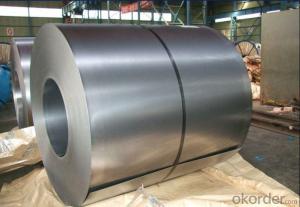High Quality Hot Rolled Stainless Steel Coil
- Loading Port:
- Tianjin
- Payment Terms:
- TT OR LC
- Min Order Qty:
- 25 m.t.
- Supply Capability:
- 50000 m.t./month
OKorder Service Pledge
Quality Product, Order Online Tracking, Timely Delivery
OKorder Financial Service
Credit Rating, Credit Services, Credit Purchasing
You Might Also Like
Hot Rolled Stainless Steel Coil description:
Model NO.:201/202/301/304/304L/316/316L/321/309S/310S/904L
Type:Stainless Steel Coil
Shape:Coil
Grade:300 Series
Certification:ISO, SGS
Perforated:Not Perforated
Standard:ASTM, AISI, JIS, DIN, EN
Technique:Hot Rolled
Surface Treatment:No.1
Width:1000mm/1219mm/1250mm/1500mm/1524mm/1829mm/2000mm
Thinckness:2.5mm-14mm
Export Markets:Global
Technical notes:
| Surface Finish | Definition | Application |
| NO.1 | The surface finished by heat treatment and pickling or processes corresponding there to after hot rolling. | Chemical tank, pipe. |
| 2D | Those finished, after cold rolling, by heat treatment, pickling or other equivalent treatment. | Construction Material, heat exchanger,exhaust pipe |
| 2B | Those finished, after cold rolling, by heat treatment, pickling or other equivalent treatment and lastly by cold rolling to given appropriate luster. | Medical equipment, Food industry, Construction material, Kitchen utensils. |
| BA | Those processed with bright heat treatment after cold rolling. | Kitchen utensils, Electric equipment, Building construction. |
| NO.3 | Those finished by polishing with No.100 to No.120 abrasives specified in JIS R6001. | Kitchen utensils, Building construction. |
| NO.4 | Those finished by polishing with No.150 to No.180 abrasives specified in JIS R6001. | Kitchen utensils, Building construction, Medical equipment. |
| HL | Those finished polishing so as to give continuous polishing streaks by using abrasive of suitable grain size. | Building Construction. |
| No.8 | A highly reflective finish obtained by polishing with successively finer abrasive and buffing extensively free of grit lines | Indoor decoration & Reflector, Hospital Equipment |
- Q: What are the different types of steel coil surface coatings?
- Steel coils can be enhanced in terms of durability, corrosion resistance, and aesthetic appearance through the use of various types of surface coatings. The most commonly employed coatings are as follows: 1. Zinc Coatings: These are widely utilized to safeguard steel against corrosion. A layer of zinc is applied to galvanized steel coils, acting as a barrier against moisture and other environmental elements. 2. Galvannealed Coatings: This type of coating combines zinc and iron, providing improved corrosion resistance and enhancing paint adhesion. It is ideal for applications that require painting. 3. Aluminum Coatings: Aluminum coatings are employed to achieve a lightweight and corrosion-resistant surface. Steel coils coated with aluminum are frequently utilized in the automotive industry for body panels and other parts that require high strength and corrosion resistance. 4. Organic Coatings: Organic coatings, typically in the form of paint or powder coatings, offer protection against corrosion. They also provide a wide range of color options for aesthetic purposes. In the construction industry, they are commonly used for roofing and cladding applications. 5. Metallic Coatings: Metallic coatings such as tin, nickel, and chromium can be applied to steel coils to confer specific properties, such as improved electrical conductivity, increased hardness, or enhanced resistance to wear and tear. 6. Ceramic Coatings: Ceramic coatings are employed to achieve high-temperature resistance and thermal barrier properties. They find application in situations where steel coils are exposed to extreme heat or in industrial processes that require thermal insulation. Each type of coating possesses unique properties and advantages, and the selection of a suitable coating depends on the specific requirements of the application. Manufacturers and engineers carefully consider factors such as cost, durability, corrosion resistance, and aesthetic appeal when deciding on the appropriate coating for steel coils.
- Q: I was cutting a sheet of steel with an angle grinder when suddenly the rate at which the blade was cutting slowed way down. I tried a few different things, and turned off the tool and looked at the blade. It didn't look damaged, but it definitely was not cutting as quickly. I thought either I had hit a harder section of steel (is that possible? It looked pretty uniform) or the blade had lost it's abrasive quality or something. Also, before this happened I had accidentally cut into the wooden sawhorse that was holding up the steel sheet, but I've done that before with no problem. After a short while the problem fixed itself and the rate of cutting went back to a fast normal. Anyone know why this happened?
- Your blade was overheated. Change it into diamond blade shall do.
- Q: What are the different types of steel alloys used in coil manufacturing?
- There are several types of steel alloys used in coil manufacturing, including carbon steel, stainless steel, and high-strength low-alloy (HSLA) steel. Each alloy has different characteristics and properties that make it suitable for specific applications in coil manufacturing. Carbon steel is commonly used for general-purpose coils due to its affordability and versatility. Stainless steel is preferred for its corrosion resistance and aesthetic appeal, making it suitable for applications that require durability and a polished finish. HSLA steel, on the other hand, offers enhanced strength and toughness, making it ideal for demanding applications that require high performance and durability.
- Q: So i downloaded Broken Steel DLC for Fallout 3 for the 360. My guy is on the level where you have to activate the purifier and when i beat it. It was the normal ending that brought me back to the main menu. My friend said you have to find some guy to talk to but i don't think thats it. Please Help. P.S. i never got and conformation in-game about the download but its under the download sub menu at the main menu.
- Try Redownloading BS, That should work.
- Q: looking to buy a sashimi knife. what is the difference between white steel (1and2) and blue steel (1and2) in terms on characteristics. what gets sharper? what holds edge longer? basically any info on the pros and cons of each steel would be SO GREATLY APPRECIATED! thanks in advance to all who answer. i'm leaning towards white-2 steel for my first sashimi knife, started training on the sushi bar and need a new tool!
- Blue Steel Knife
- Q: What materials are used to make steel coils?
- Steel coils are primarily made from iron ore, coke, limestone, and scrap steel.
- Q: How are steel coils used in the manufacturing of wires?
- Steel coils are used in the manufacturing of wires by being fed into wire drawing machines, where they are gradually reduced in diameter through a series of dies. The steel coils serve as the initial raw material, providing the necessary strength and flexibility for the wires to be produced.
- Q: How are steel coils used in the production of steel framing systems?
- Steel coils are used in the production of steel framing systems as they are the primary raw material. These coils are unwound and fed into a roll forming machine, where they are shaped into the desired profiles and lengths. The steel framing systems, including studs, tracks, and joists, are then fabricated from these formed coils, providing structural support and stability to buildings and structures.
- Q: How are steel coils used in the manufacturing of chassis frames?
- Steel coils are used in the manufacturing of chassis frames by being processed and formed into specific shapes and dimensions. The coils are first uncoiled and then passed through various machines to cut, bend, and weld them into the desired frame structure. This process ensures that the chassis frame is strong, durable, and able to withstand the demands of a vehicle's weight and functionality.
- Q: How are steel coils used in the production of steel chains?
- Steel coils are used in the production of steel chains as the raw material. These coils are fed into a machine called a chain-making machine, which shapes and cuts the steel into individual links. The links are then connected together to form the chain, creating a strong and durable product.
Send your message to us
High Quality Hot Rolled Stainless Steel Coil
- Loading Port:
- Tianjin
- Payment Terms:
- TT OR LC
- Min Order Qty:
- 25 m.t.
- Supply Capability:
- 50000 m.t./month
OKorder Service Pledge
Quality Product, Order Online Tracking, Timely Delivery
OKorder Financial Service
Credit Rating, Credit Services, Credit Purchasing
Similar products
Hot products
Hot Searches
Related keywords
